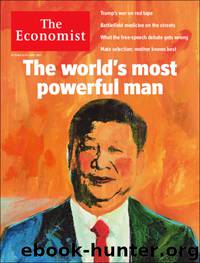The Economist - 14 October 2017 by The Economist

Author:The Economist
Language: eng
Format: mobi
Publisher: The Economist
Published: 2017-10-13T00:11:28.248000+00:00
Palace insiders
Many eastern Europeans feel nostalgia for the communist era
Though few really want the dictators back
Oct 12th 2017 | BUCHAREST
“OH MY God! We had all of these!” trills Alina Radu, a 43-year-old businesswoman visiting the Romanian Kitsch Museum. She is admiring crochet doilies, a 1980s TV set, decorative glass fish and the scarves and badges of Romania’s Pioneers, a communist-era youth organisation. “I loved looking like a general!” The museum, which opened in May, has proved a hit.
You can lie on a bed and fling fake bank notes over yourself for a picture—“though not naked, OK?” chortles a lady buying tickets for herself and her 60-something friends. You can examine night-light crucifixes, some of the most tasteless clothes of the past quarter-century and pictures of sceptre-wielding Roma (gypsy) “kings”. But for many the most interesting items are those which date from before the revolution of 1989.
The grim decades of Romanian communism draw substantial crowds. Across town up to 400 people a day visit the mansion inhabited by the communist dictator, Nicolae Ceausescu, and his family from 1965 to 1989. After the revolution the opulent villa became a government guest-house, but it was preserved unchanged. The house is full of heavy old-fashioned furniture, gloomy bedrooms and plenty of gold mosaics and gold taps—though not real gold, the guide adds hastily: “That was a story spread during the revolution.”.
It is not just in Romania that locals and tourists can be persuaded to part with cash in exchange for tickets to survey their past. In Albania plans are afoot to open the house of Enver Hoxha, the communist who ruled the country for 41 years. In Rijeka, in Croatia, local authorities have secured EU funding to restore the Galeb, the once-sumptuous yacht on which Josip Broz Tito, the Yugoslav leader, once sailed the seven seas.
Opinion polls in eastern Europe show that many people believe things were better under communism. Gabriela Alexandru, selling tickets at the Kitsch Museum, has another interpretation. She thinks visitors are nostalgic “not for the past, or Ceausescu, but for their youth.” In the component countries of the former Yugoslavia they call it “Yugonostalgia”. Ms Radu agrees. No one wants to go back to the way it was. But, she says, in those times people “took care of each other”.
Download
This site does not store any files on its server. We only index and link to content provided by other sites. Please contact the content providers to delete copyright contents if any and email us, we'll remove relevant links or contents immediately.
The Brazilian Economy since the Great Financial Crisis of 20072008 by Philip Arestis Carolina Troncoso Baltar & Daniela Magalhães Prates(132287)
International Integration of the Brazilian Economy by Elias C. Grivoyannis(106927)
The Art of Coaching by Elena Aguilar(53134)
Flexible Working by Dale Gemma;(23282)
How to Stop Living Paycheck to Paycheck by Avery Breyer(19681)
The Acquirer's Multiple: How the Billionaire Contrarians of Deep Value Beat the Market by Tobias Carlisle(12298)
Thinking, Fast and Slow by Kahneman Daniel(12205)
The Radium Girls by Kate Moore(12001)
The Art of Thinking Clearly by Rolf Dobelli(10378)
Hit Refresh by Satya Nadella(9101)
The Compound Effect by Darren Hardy(8903)
Tools of Titans by Timothy Ferriss(8346)
Atomic Habits: Tiny Changes, Remarkable Results by James Clear(8304)
Turbulence by E. J. Noyes(8001)
A Court of Wings and Ruin by Sarah J. Maas(7781)
Change Your Questions, Change Your Life by Marilee Adams(7716)
Nudge - Improving Decisions about Health, Wealth, and Happiness by Thaler Sunstein(7676)
How to Be a Bawse: A Guide to Conquering Life by Lilly Singh(7455)
Win Bigly by Scott Adams(7164)
